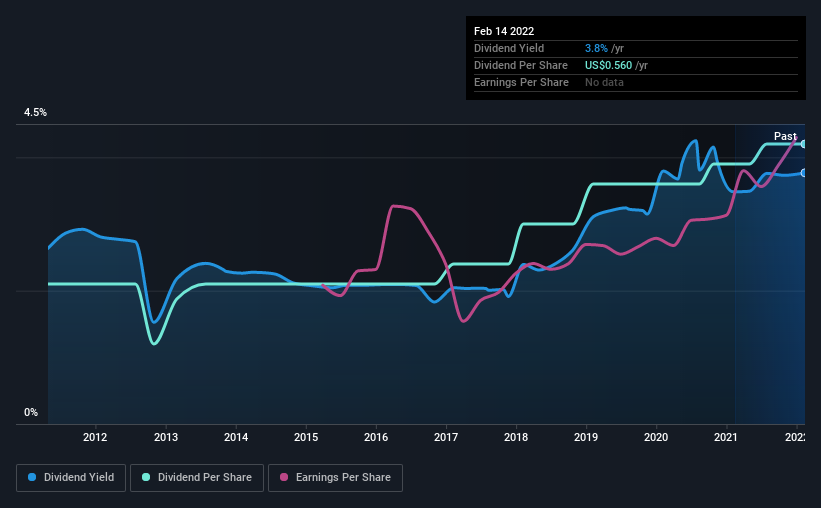- United States
- /
- Banks
- /
- NasdaqGM:LSBK
Lake Shore Bancorp (NASDAQ:LSBK) Is Increasing Its Dividend To US$0.16

The board of Lake Shore Bancorp, Inc. (NASDAQ:LSBK) has announced that it will be increasing its dividend on the 17th of March to US$0.16. The announced payment will take the dividend yield to 3.8%, which is in line with the average for the industry.
View our latest analysis for Lake Shore Bancorp
Lake Shore Bancorp's Dividend Is Well Covered By Earnings
We like a dividend to be consistent over the long term, so checking whether it is sustainable is important. Prior to this announcement, Lake Shore Bancorp's dividend was comfortably covered by both cash flow and earnings. This indicates that a lot of the earnings are being reinvested into the business, with the aim of fueling growth.
Over the next year, EPS could expand by 13.7% if recent trends continue. If the dividend continues along recent trends, we estimate the payout ratio will be 51%, which is in the range that makes us comfortable with the sustainability of the dividend.

Dividend Volatility
The company has a long dividend track record, but it doesn't look great with cuts in the past. The dividend has gone from US$0.28 in 2012 to the most recent annual payment of US$0.56. This implies that the company grew its distributions at a yearly rate of about 7.2% over that duration. We like to see dividends have grown at a reasonable rate, but with at least one substantial cut in the payments, we're not certain this dividend stock would be ideal for someone intending to live on the income.
The Dividend Looks Likely To Grow
With a relatively unstable dividend, it's even more important to see if earnings per share is growing. It's encouraging to see Lake Shore Bancorp has been growing its earnings per share at 14% a year over the past five years. Since earnings per share is growing at an acceptable rate, and the payout policy is balanced, we think the company is positioning itself well to grow earnings and dividends in the future.
We Really Like Lake Shore Bancorp's Dividend
Overall, a dividend increase is always good, and we think that Lake Shore Bancorp is a strong income stock thanks to its track record and growing earnings. Distributions are quite easily covered by earnings, which are also being converted to cash flows. Taking this all into consideration, this looks like it could be a good dividend opportunity.
It's important to note that companies having a consistent dividend policy will generate greater investor confidence than those having an erratic one. However, there are other things to consider for investors when analysing stock performance. For example, we've picked out 2 warning signs for Lake Shore Bancorp that investors should know about before committing capital to this stock. Looking for more high-yielding dividend ideas? Try our collection of strong dividend payers.
New: AI Stock Screener & Alerts
Our new AI Stock Screener scans the market every day to uncover opportunities.
• Dividend Powerhouses (3%+ Yield)
• Undervalued Small Caps with Insider Buying
• High growth Tech and AI Companies
Or build your own from over 50 metrics.
Have feedback on this article? Concerned about the content? Get in touch with us directly. Alternatively, email editorial-team (at) simplywallst.com.
This article by Simply Wall St is general in nature. We provide commentary based on historical data and analyst forecasts only using an unbiased methodology and our articles are not intended to be financial advice. It does not constitute a recommendation to buy or sell any stock, and does not take account of your objectives, or your financial situation. We aim to bring you long-term focused analysis driven by fundamental data. Note that our analysis may not factor in the latest price-sensitive company announcements or qualitative material. Simply Wall St has no position in any stocks mentioned.
About NasdaqGM:LSBK
Lake Shore Bancorp
Operates as the savings and loan holding company for Lake Shore Savings Bank that provides banking products and services in New York.
Flawless balance sheet with proven track record.
Similar Companies
Market Insights
Community Narratives



